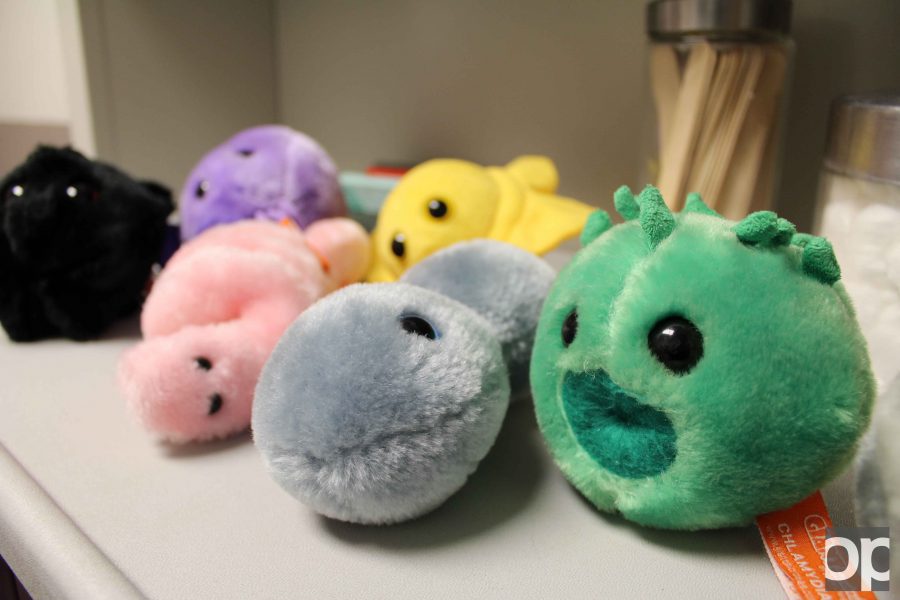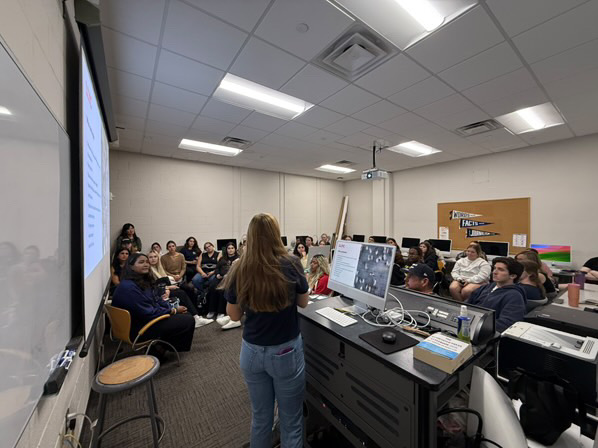Get Yourself Tested Campaign encourages STD awareness
Graham Health Center educates OU students about STDs through the Getting Yourself Tested campaign
Representations of sexually transmitted diseases are on display at the Graham Health Center to raise awareness.
Sexually transmitted diseases (STDs) are a perpetual topic on college campuses. As college students are introduced to a new environment, experimenting on a campus can lead to severe, unintentional health issues.
The social movement of the Get Yourself Tested Campaign (GYT) is striving to raise young adults’ awareness for about STDs and make testing a normal behavior. According to the Centers for Disease Control and Prevention, the national campaign is partnered with American College Health Association, Kaiser Family Foundation, the National Coalition of STD Directors, MTV and Planned Parenthood Federation of America.
Nancy Jansen, director of Oakland University’s Graham Health Center (GHC), explained the importance of getting tested and understanding STDs.
Jansen said the frequency of STDs has increased nationwide. In Oakland County, there are an estimated 4,000 cases of chlamydia and 1,000 cases of gonorrhea.
“So many people think they don’t have it [STDs],” Jansen said.
Jansen is concerned that there is a lack of awareness.
“A lot of people don’t want to participate in our screening because they think they feel fine,” she said.
Jansen said it’s difficult to get students to get tested, but getting students to recruit other students has become a successful approach.
“Sometimes we’ll have a GYT event each semester,” Jansen said. “Sometimes it’s very successful, sometimes not so much. More recently, we’re trying to direct it [GYT events] more toward the health center … We’re trying to do whatever works to reach the students.”
Jansen said most infections of chlamydia and gonorrhea are in young adults, and this is a critical reason for the GYT campaign to be in schools.
“One in two young adults will get an STD by the time they’re 25,” Jansen said. “If I had the money, I would expand the program and do a whole lot more.”
STDs have various symptoms and consequences. Jansen explained just the surface of them.
“Infertility is [caused] by chlamydia and gonorrhea,” Jansen said. “Infertility is usually preceded by severe pelvic pain and pelvic infection. If it’s not caught early, the loss of fertility is because of the general infection.”
Jansen said the recently encouraged HPV vaccine (Gardasil) is extremely effective at preventing many cancers.
“I can’t stress enough how many cancers I’ve seen in my career, directly related to HPV, and it can happen many years later,” Jansen said. “I think many students are afraid of the HPV vaccine, many parents are not certain, nor encouraging it.”
She also said many insurance companies are mandated to cover the HPV vaccine until 26 years of age.
She explained that most insurance plans also cover general STD testing.
“If students have insurance, they go to their primary care provider, and most of the time, GHC can provide it, depending on the health insurance,” Jansen said.
Sophomore Nadine Brikho and senior Peter Keum shared their perspectives on STDs.
“I think it’s very important that students get tested for STDs, considering they are more likely to explore their sexual side during college,” Brikho said. “I am educated enough about STDs. In my high school gym class, our teacher brought a speaker to talk to us about STDs.”
Keum learned about STDs in his biology classes.
“Depending on how sexually active they are, if they’ve had multiple partners, or a sexual partner, get tested once a year for screening,” he said. “If you’re in an area where STDs are prevalent, definitely. It depends. It’s not for everyone. Especially if you’re monogamous, I don’t think it’s as pressing. It can spread and affect anyone.”






